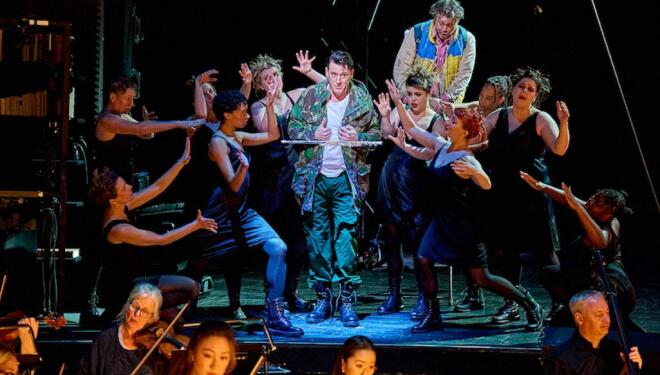
We visit this rarified world by cracking open the mummified remains of his father, from which the new, spotless pharoah emerges. And through the twin prisms of Victorian amateur archaeology and modern tourism, we re-enter Ancient Egypt to the sound of Glass's deceptively restless music. Like echoes from the past, its phrases evolve imperceptibly, as hard to define as the shifting contours of sand dunes.

Anthony Roth Costanzo in costumes by Kevin Pollard. Photo Jane Hobson
Director Phelim McDermott and Improbable first staged this new production of Glass's 1983 opera in 2016. This first revival again stars American counter-tenor Anthony Roth Costanzo in the title role, giving a career-defining performance of awe-inspiring grace and otherworldliness.
Conductor Karen Kamensek, who specialises in Glass's music, spins the seemingly endless thread that is this entrancing score.
While a privileged, single-minded life unfolds at a speed that feels as though it could be everlasting, the more urgent movements of reality are represented by the quick-fire moves of the Gandini Juggling Company, whose tricks reference practices in ancient Egypt and other cultures, as told by tomb paintings.
The three acts have no conventional libretto, but rather, untranslated texts in ancient languages, including Hebrew and Akkadian. The words don't matter a jot. In fact, the sporadic declaiming in English by a Scribe (Zachary James), if anything, tends to break the spell. For this is pure magic: a hypnotic, mesmerising experience that slows the pulse and quickens the heart.
I compared notes with others: three of us all drifted into a delicious semi-consciousness at the same time – during the snail's-pace ascent of a staircase...

Katie Stevenson as Nefertiti and Anthony Roth Costanzo as Akhnaten. Photo: Jane Hobson
While Costanzo's captivating performance in the title role dominates the evening, the two women in Akhnaten's life, his wife and mother, are sung with charm but also with the urgency of observers who see a loved one bound for self-destruction. Rebecca Bottone reprises her 2016 role as the mother, Queen Tye: a Queen Mary lookalike with her bustle, pearls and furs raided from Africa.
Katie Stevenson as Nefertiti is entrancing as the sexually ambiguous female alter ego of Akhnaten; the couple's second act duet reawakening the gods of Handel and Monteverdi. Their six daughters, literally and metaphorically bound together, are beautifully sung and their disappearance, as one, is affecting.
Through the remote world of these three creep the ordinary people, who will not stay in the background for ever. Symmetry gives way to disorder: another pharoah is on the horizon...

Gandini Jugglers send planets into orbit. Photo: Jane Hobson
Creating this dream world is designer Tom Pye with magical lighting by Bruno Poet. The spectacular costumes of Kevin Pollard combine the lavish glamour of that other great Egyptian opera, Aida, with spare and gauzy simplicity. When Akhnaten falls to the ground in a leafy white wrap, he all but disappears – a flamboyant butterfly gone and a cocooned grub in its place.
The Orchestra and Chorus of English National Opera, on the other hand, never falter, conjuring up voices and sounds from the ancient past to create an unforgettable and contemporary occasion. Catch this, whatever you do, before it slips away.
'Akhnaten' is sung in ancient languages with no surtitles. Further performances on 21, 23,28 Feb; 2, 7 March.
| What | Akhnaten review , English National Opera |
| Where | English National Opera, London Coliseum, St Martin's Lane, London, WC2N 4ES | MAP |
| Nearest tube | Embankment (underground) |
| When |
11 Feb 19 – 07 Mar 19, six performances, plus one at 6:30PM on 2 March |
| Price | £12-£125 |
| Website | Click here for more information and booking |






